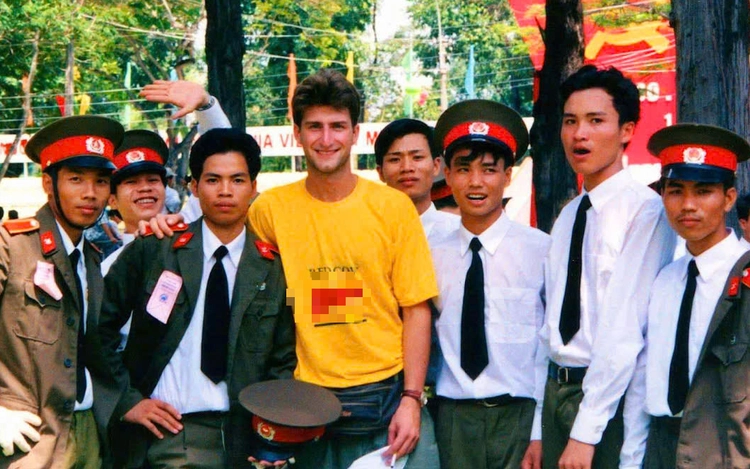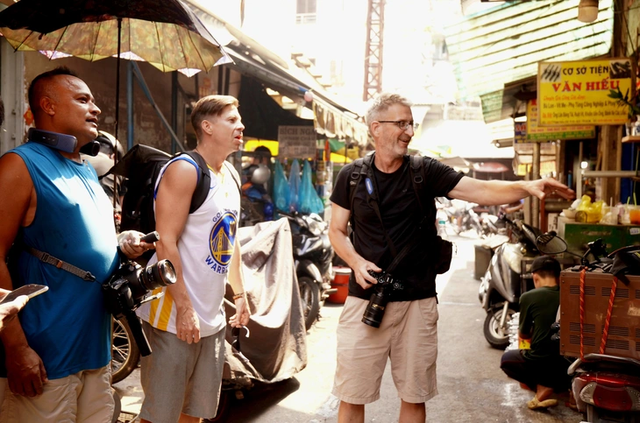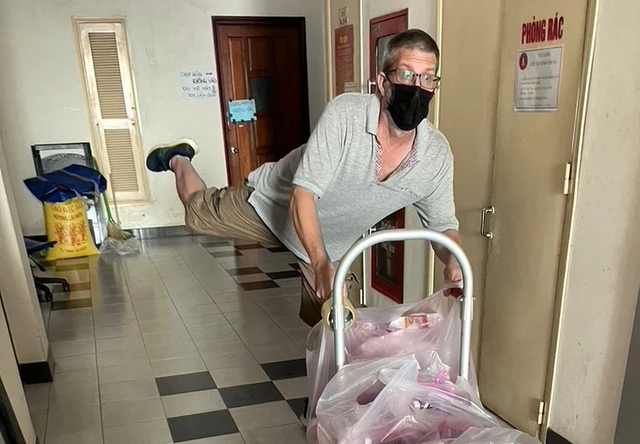
File photo: Derek William Page (in yellow) poses with Vietnamese soldiers during a military parade marking the 20th anniversary of national reunification in Ho Chi Minh City, April 30, 1995.
Page, then a newcomer, had never seen anything quite like it — the scale, the discipline, the pride.
That moment marked the beginning of a relationship with the country that would eventually become something much more than professional or even personal. It became home.
Now in his fifties, Page is a fixture in the rhythms of everyday life in Ho Chi Minh City.
With his Vietnamese wife, Tran Thi Minh Van, he prepares each April for the reunification holiday with the kind of care one might give to Christmas or Lunar New Year.
This year, as Vietnam approaches the 50th anniversary of reunification, the couple has already bought red T-shirts emblazoned with the gold star of the Vietnamese flag and the slogan 'Nothing is more precious than independence and freedom.'
Though he still does not speak much Vietnamese, Page has become something of a local guide whenever foreign friends come to visit.
He insists they skip the standard tourist routes.
Instead, he walks them through hidden alleyways and crowded street corners, taking them to sidewalk eateries and late-night markets where he knows the vendors by name.
He says with quiet certainty that anyone who spends real time in Vietnam — walking its streets, talking with its people — will fall under its spell the way he did.
One of those friends is John Ligon, an American who recently arrived in Vietnam.
Not long after landing, Ligon found himself at a makeshift noodle stall in District 5, pulled there by Page's infectious enthusiasm.
That same afternoon, they wandered through the Ha Ton Quyen market, where 80-year-old metal-cutting tools are still in use.
Page watched with amusement as Ligon, in halting Vietnamese, tried to greet shopkeepers, whose hands were slick with machine oil and sweat and whose smiles were effortless and kind.
Together, the two men snapped photos of daily life — of vendors hoisting sacks of bolts, of weathered faces and gleaming eyes.
Ligon, who had studied Vietnamese in Hanoi and dreamed of settling in Da Nang, told Page that this spontaneous detour might be the most persuasive 'sales pitch' he had ever experienced.
He meant it as a joke, but said the decision to stay felt deeply right.

Derek William Page (right) introduces Vietnam to international friends as a welcoming destination. Photo: An Vi
How Vietnam became home
Page arrived in Vietnam in the mid-1990s after an enterprise offered him a job in either China or Vietnam.
Drawn by stories of a country that had survived enormous hardship with resilience and pride, he chose Vietnam — even though he suspected it would be the more difficult option.
He packed a bag and flew to Ho Chi Minh City, eventually landing a job at a telecommunications firm during the earliest days of the mobile phone boom.
Back then, cell service was still a novelty.
The city itself was just beginning to transform.
He recalled his first impressions clearly: the military parades, the discipline of the soldiers, the powerful sense of national unity.
He had seen parades before, but few that carried the same emotional weight.
The people around him were proud, hopeful — determined.
That energy left a mark on him.
So did a young woman named Tran Thi Minh Van. They met, fell in love, and married.
Their affection, Page said, was visible in every part of their life together — in how they worked, talked, and wandered the city.
Eventually, they opened a photography studio. He took pictures; she did makeup.
On their off days, they roamed the city's neighborhoods, capturing portraits of daily life: workers, street vendors, children playing in alleys.
He often said that the smiles of the Vietnamese people had changed him.
When he photographed them — eyes crinkling, mouths curved in warmth — he began to mirror their expression unconsciously.
Their work was hard, but they did not complain. They trusted in tomorrow.
He came to describe Vietnam to friends as a country of quiet optimism.
One by one, his relatives and friends began to visit. Some stayed.
He said that if people only knew Vietnam through the lens of wartime history, they were missing the real story — one of transformation, possibility, and joy.
But perhaps no moment captured the spirit of Page's adopted home more clearly than during the depths of the COVID-19 pandemic.
As Ho Chi Minh City fell silent under lockdowns and curfews, sirens echoed through the streets, Page and his wife watched their studio business slow to a halt.
Rather than retreat inward, they joined volunteer groups — cooking meals, delivering food to the elderly and the quarantined, raising money through Page's contacts back in Canada.

Derek William Page delivers charity goods during the COVID-19 pandemic in Ho Chi Minh City. Photo: Van Tran
Page remembered hauling supplies down stairwells and across empty streets, grateful for something to do.
He said the solidarity was profound: the healthy helped the sick; those with more helped those with less.
Together with a youth-led group called Go Volunteer, the couple helped prepare hundreds of meals a day.
In return, city authorities and neighborhood donors sent rice, vegetables, and other essentials — a cycle of giving that, Page said, deepened his love for the country even more.
Reflecting on it all — the pandemic, the parades, the everyday gestures of kindness — Page said what struck him most about Vietnam was not its history but its future.
He told friends that Vietnamese people always seemed to believe things would get better, no matter the circumstances.
"Ask them about this year," he said, "and they'll tell you next year will be better."
It was this unshakable optimism, this belief in what comes next, that had first drawn him in — and what had convinced him to stay.
"April 30 is expected to be very crowded, and my husband and I are worried we might not be able to squeeze in," said Tran Thi Minh Van, Derek William Page's spouse.
"But even if we can't watch the festivities, just being out on the streets will be fun.
"Everyone will be out cheering—it's a lively atmosphere.
"We're definitely going."


Max: 1500 characters
There are no comments yet. Be the first to comment.